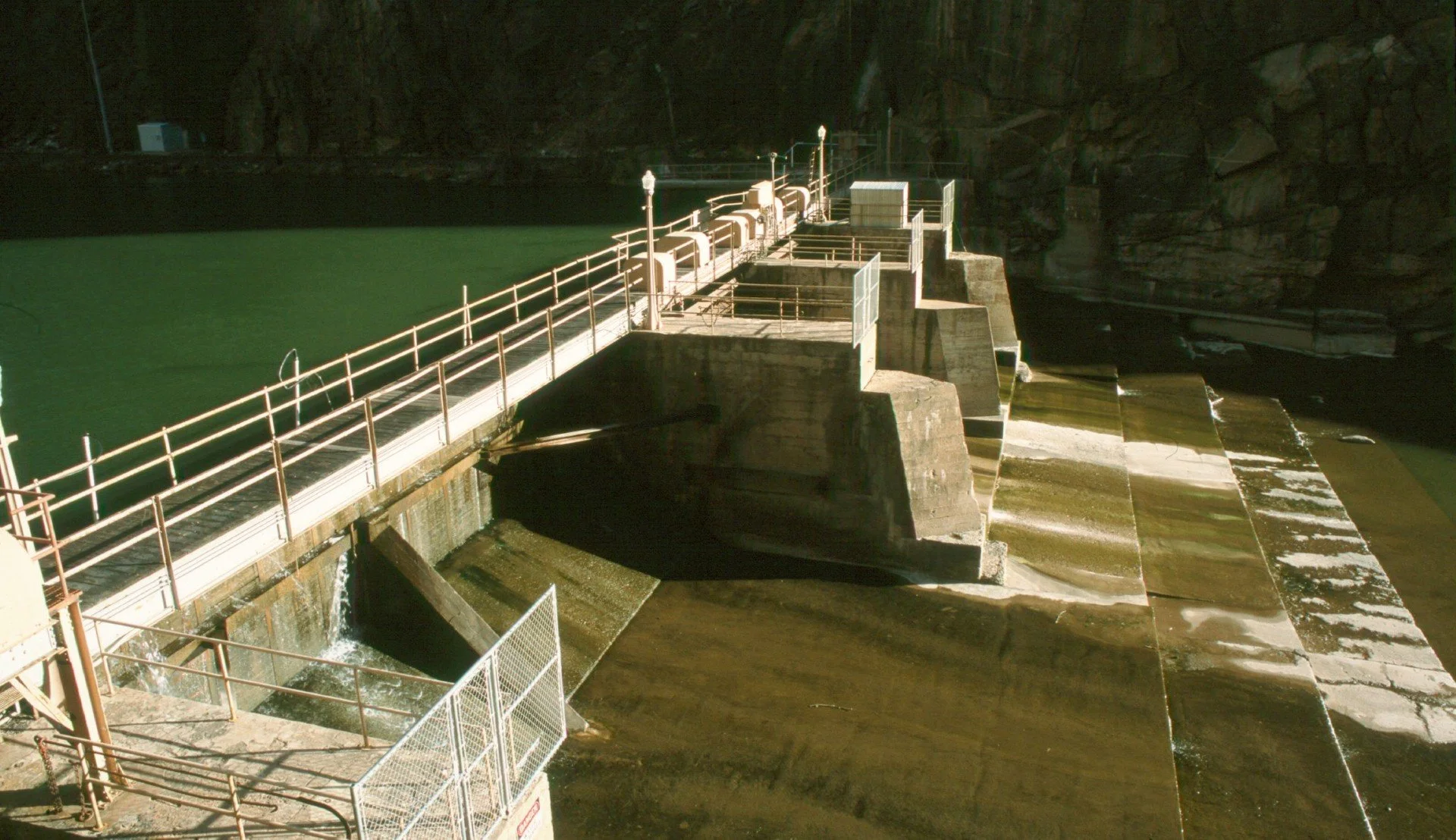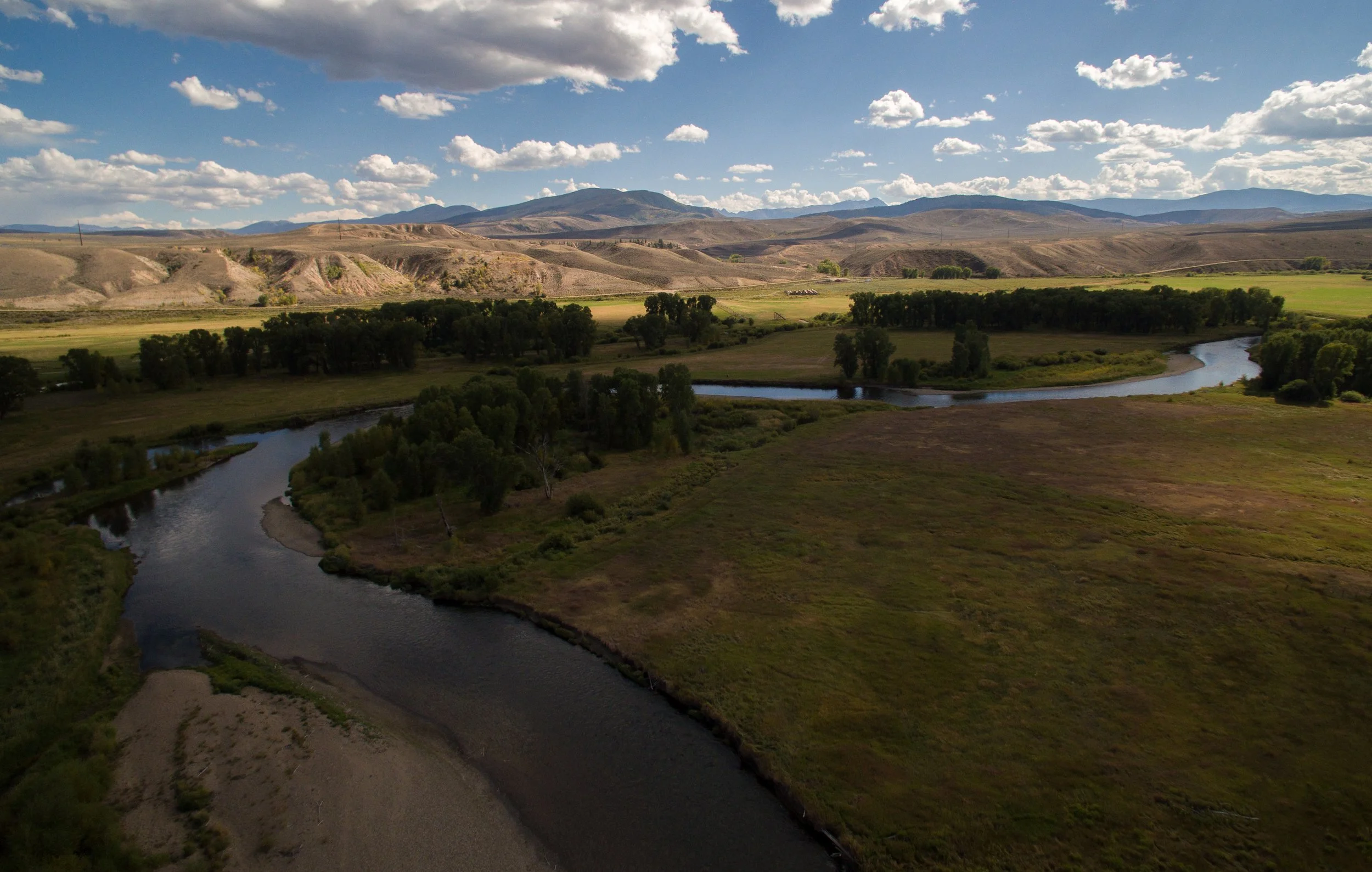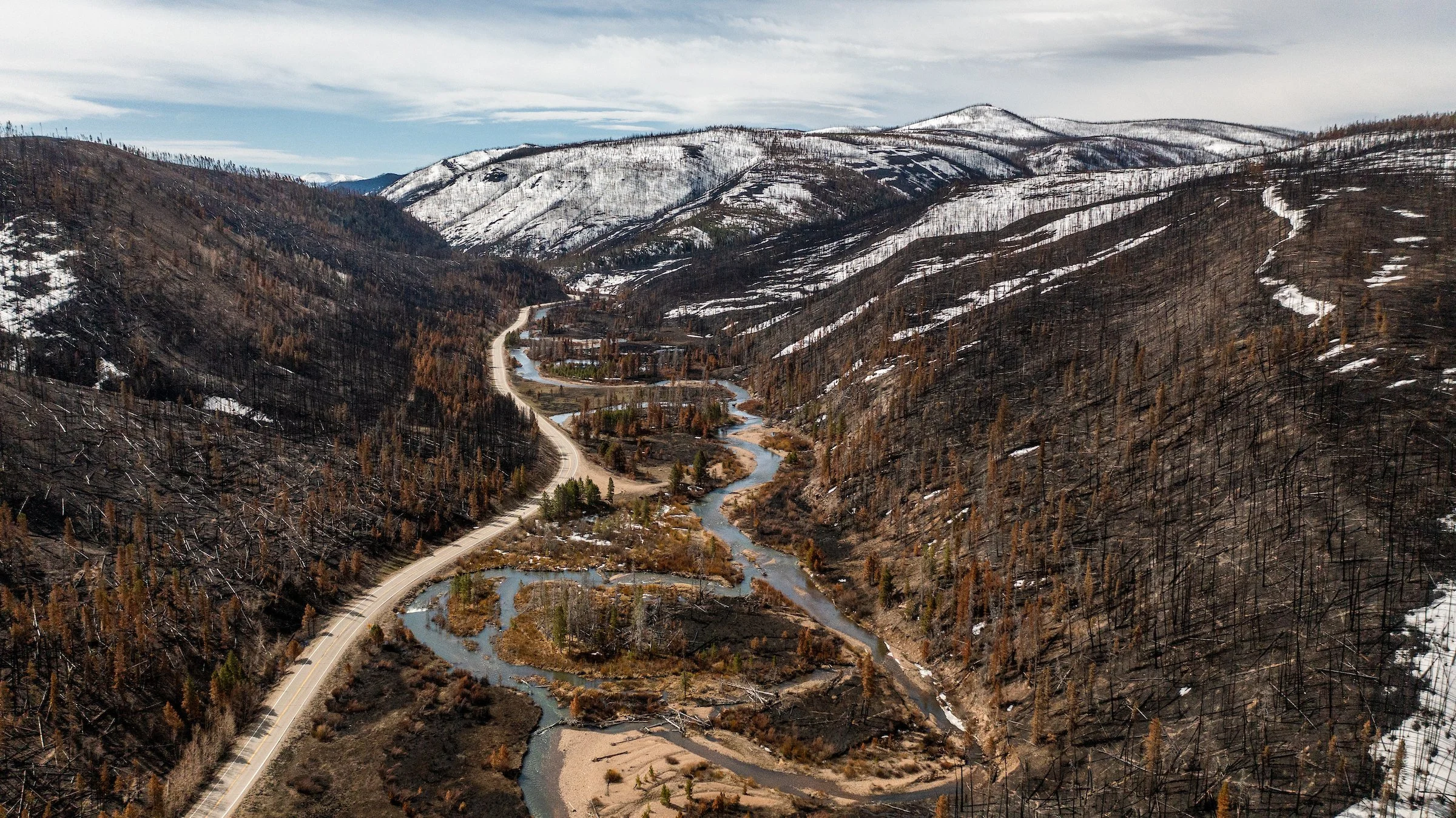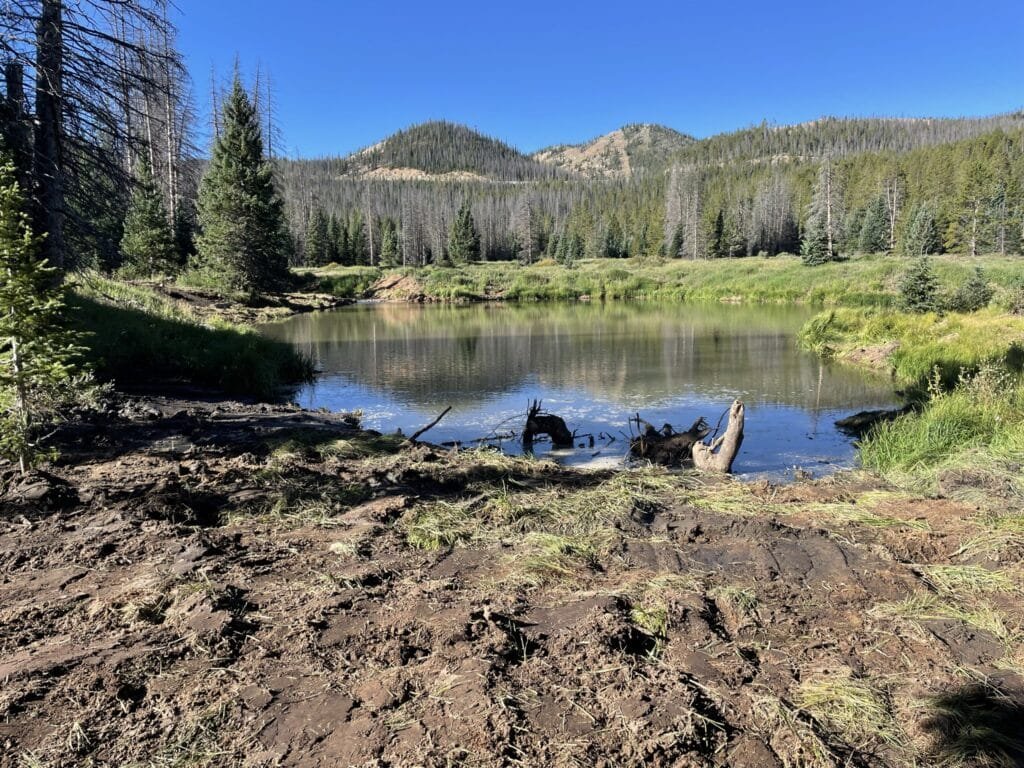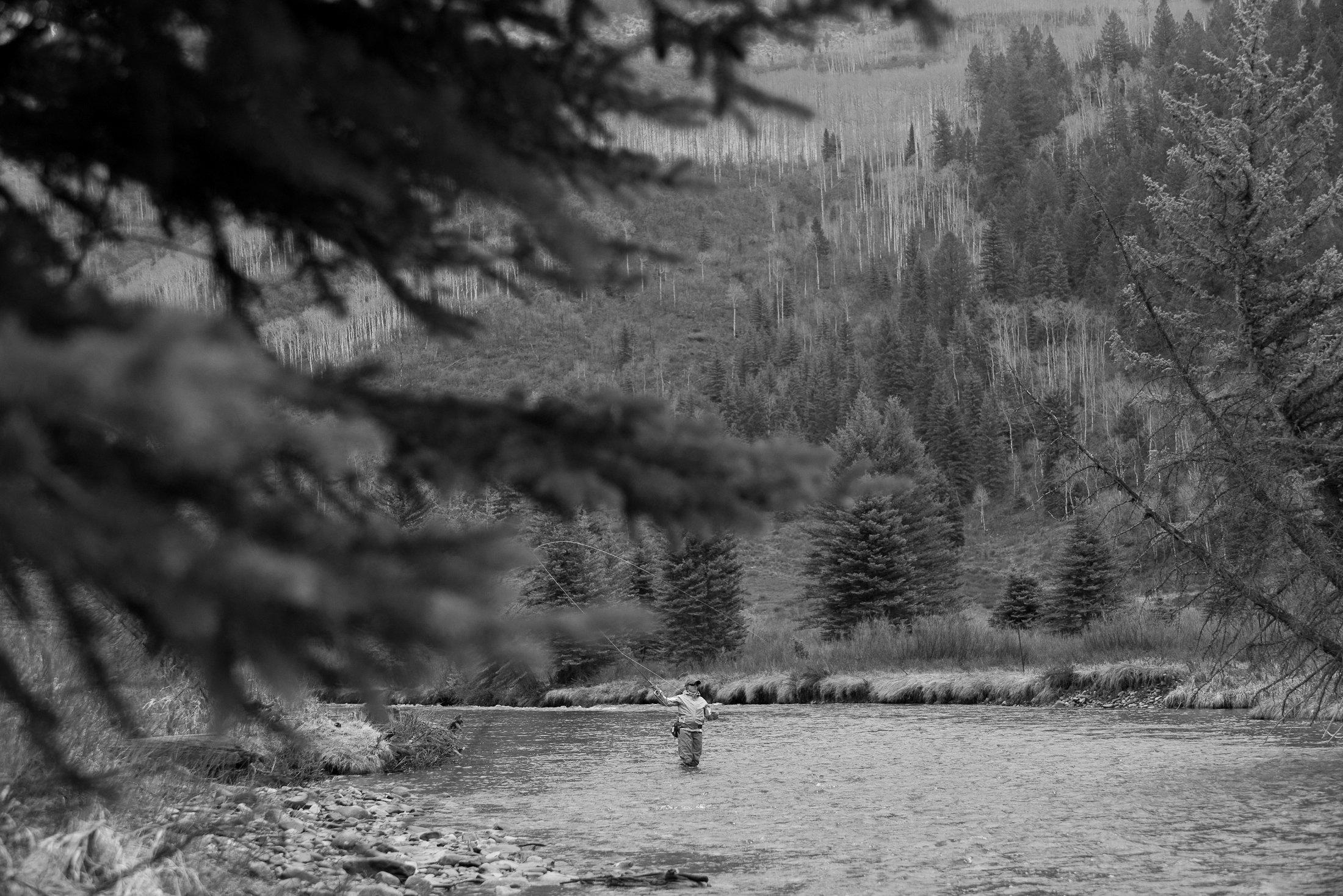CTU staff and volunteers will be at this year’s Denver Fly Fishing Show January 19th - 21st at the Gaylord Rockies Event and Convention Center. Drop by and see us, or you can sign up to volunteer at our booth for a block of time and receive a parking reimbursement and admission to the show while you’re not at the booth. Sign up through the button below to see available times.
Monarch Park Ponds Restoration: A Collaborative Effort for Sustainable Fishing Access
By Nick Gann, Southwest Communications Director
Near the top of Monarch Pass, which rises to 11,312 feet, are the Monarch Park Ponds nestled among this picturesque landscape. During the summer of 2023, a restoration project quietly unfolded as a testament to the power of collaboration. This ambitious endeavor was not just about restoring lost fishing access, but also about rejuvenating an ecosystem that has faced challenges for 15 years.
Spearheaded by Trout Unlimited in partnership entities such as the U.S. Forest Service (USFS), Colorado Parks and Wildlife (CPW), Newmont’s Cripple Creek & Victor Gold Mine, Freeport McMoRan, Colorado Department of Transportation (CDOT), U.S. Lime and Minerals, and Collegiate Peaks Chapter of TU, this restoration project set new standards in environmental stewardship.
“For more than 15 years, the Monarch Park Ponds have faced increasing sediment accumulation stemming from the surrounding basin and highway,” said Jason Willis, TU’s western Abandoned Mine Lands (AML) program director. “The degradation of these ponds prompted a comprehensive restoration effort and desire to replace the expected loss of fishing access from the nearby South Fooses Dam removal that is scheduled to take place in 2024.”
In response to the substantial sediment accumulation that had filled several ponds due to the adverse impacts of highway sand and erosive decomposing soils, a series of initiatives were implemented to breathe new life into these ponds. Undertaking an exhaustive dredging effort, approximately 1,860 cubic yards of dredge material were meticulously transported to U.S. Lime and Minerals for stockpiling.
Next, nine trees with roots intact were used to plug the old pond outlet resulting in undercut habitat for fish. This structure also allowed for the construction of a new channel between two of the ponds to protect a nearby access road from future encroachment.
A degraded levee near the ponds also received an upgrade with TU bolstering the spillway with a mix of riprap (angular rock between 4 and 12 inches), 3 to 4-foot boulders, and native vegetation to maintain the desired water levels in the ponds. This also allowed excess water to enter the spillway in a controlled manner and continue to move downstream.
Additional measures, such as channel shaping, bank stabilization, erosion controls, and grade controls were also undertaken to improve habitat and allow for renewed fishing opportunities next year.
“The success of the Monarch Park Ponds Restoration project is indebted to the generous contributions and collaborative spirit of its diverse group of partners,” said Willis. “Our partners played pivotal roles in donating the time, equipment, and manpower to the project. Newmont Mining, Freeport McMoRan, and TU’s Keystone Agreement with the USFS also provided essential funding, infusing the project with the financial support required for its ambitious goals.”
As the landowner, the USFS was also instrumental in providing staff specialists to complete necessary environmental review processes, concurrence, and project oversight. The great communication by USFS throughout the project really allowed partners to collaborate on ideas and crucial field decisions.
In terms of time and resources, CDOT and CPW made significant contributions. CDOT, recognizing the importance of the project, contributed haul trucks and facilitated the transportation of dredge material to U.S. Lime and Minerals. CPW, on the other hand, demonstrated their commitment by donating personnel time, expert operator time, and crucial equipment such as an excavator and loader. Their contributions went beyond mere support, with both agencies actively participating in the restoration process and contributing to the project’s success.
As a key partner, U.S. Lime and Minerals also demonstrated unparalleled generosity by allowing project partners to surpass the initially planned dredging amount. This flexibility enabled the removal of additional accumulated material from the ponds, contributing significantly to the overall success of the restoration.
The TU Collegiate Peak Chapter will also become a driving force for the project’s future phases. Securing a grant for the installation of an ADA pier on one of the ponds, this chapter will play a crucial role in addressing the accessibility challenges that will occur from the removal of Fooses Dam next year.
In essence, the Monarch Park Ponds Restoration project stands as a shining example of what can be achieved through collaboration and environmental stewardship. This unique restoration initiative, fueled by federal infrastructure funding, not only restores lost fishing access but also ensures a sustainable future for the local community. With improved ADA access, enhanced habitats, and a commitment to ecological balance, Monarch Park Ponds is poised to become a haven for anglers as well as a thriving ecosystem for generations to come.
The New Winter Issue of High Country Angler is Live!
Your new Winter 2024 issue of High Country Angler is here!
Check out the Winter 2024 issue of High Country Angler e-zine, including these stories:
· Landon Mayer talks winter fishing with midges in The Cycle of Life;
· Brian LaRue visits The Miracle Mile in You’ve Never Fished the Mile?;
· Colorado TU Staff announces its CTU River Conservation and Fly Fishing Camp registration is open!;
· Joel Evans talks about the 8 River Rodeo with Rodeo of a Different Kind;
· Colorado TU Staff updates you on how TU is helping restore strongholds for Colorado’s native trout with Return of the Natives;
· Peter Stitcher with How to Build a Euro Leader;
· Other columns by Hayden Mellsop, Joel Evans, and the Old Professor!
December 2023 Currents
THIS MONTH’S ISSUE OF CURRENTS FEATURES End of Year Giving, Protect the Thompson Divide, CTU Youth Camp Registration, AND MORE!
Protect the Thompson Divide – Speak Out for Trout Today
The Thompson Divide stands – as its name suggests – atop a drainage divide, with streams flowing toward the North Fork Gunnison, Crystal, Roaring Fork, and Colorado Rivers depending on which portion of the Divide you are standing. The area supports some of Colorado’s most pristine trout waters and critical habitat for big game. In his travels in western Colorado, President Theodore Roosevelt described the Thompson Divide as “great, wild country” and today it remains one of the largest expanses of roadless forest in Colorado. Trout Unlimited has been working for years to secure long-term protections for the Thompson Divide.
Today, you can help protect this valuable landscape from the impacts of oil and gas development. The US Forest Service is currently taking public comment through January 8 on its proposal to withdraw the Thompson Divide from mineral extraction for the next twenty years. Please visit the Forest Service’s online public comment page and voice your support for protecting the Thompson Divide.
The Forest Service issued a draft environmental assessment evaluating the proposal and with two identified alternatives: Alternative A, which would keep existing leases in place but withdraw the area from new mineral entry for the next twenty years, and Alternative B, which would keep the area open to new oil and gas leasing. The proposed withdrawal (Alternative A) would protect nearly 225,000 acres in the Thompson Divide, encompassing a total of 1,550 stream miles including 83 miles of native cutthroat trout streams, 12 acres of cutthroat lake habitat, and nearly four and a half miles of Gold Medal trout fishing waters along the Roaring Fork. TU supports Alternative A to protect these outstanding fishery resources and their watersheds.
The Forest Service comment page includes a basic form where you can provide your contact information and then enter your comments online. Some points to consider sharing in your comments include:
· Urge the Forest Service to adopt Alternative A to ensure protection of the outstanding habitats within the Thompson Divide.
· Watersheds in the Thompson Divide support vital native trout habitat and feed some of Colorado’s most famed trout rivers including the Crystal, Roaring Fork and Colorado. These areas not only support important fish habitats but also are a key driver of local economies.
· The proposed withdrawal strikes an appropriate balance, respecting existing leases while ensuring that new leasing does not occur for the next 20 years and jeopardize the area’s critical habitat values.
· Consider sharing any personal experiences you have with the Thompson Divide, or with the downstream waters that rely on it as a source of high-quality water.
While permanent protection of this area can only be achieved by an act of Congress, and TU continues to support passage of the CORE Act from Senators Bennet and Hickenlooper and Congressman Neguse, this withdrawal is a vital step in the right direction and will conserve the Thompson Divide for the next 20 years while we continue to work toward permanent protection.
Click below to visit the Forest Service public comment form and add your voice in support of protecting the Thompson Divide.
Clear Fork E Muddy Barrier Project Completed
Last month, we updated you on the Progress on the Clear Fork E Muddy Barrier Project. This week, it has been completed. In the next few years, approximately 13 miles of green lineage Colorado River Cutthroat Trout (CRCT) habitat will be restored. As with many native fish restoration projects, this will be done in two phases. Phase 1 includes the installation of the fish barrier and will result in establishment of a downstream barrier to isolate the native trout population which will allow CRCT to re-establish in the main stem of Clear Fork of Muddy Creek. Phase 2 includes a chemical and mechanical removal of introduced brook trout above the barrier and monitoring for barrier success and cutthroat repopulation. With the goal to increase the overall cutthroat population and to restore inter-connectivity of smaller tributaries, this project will be a catalyst to surrounding cutthroat projects allowing subsequent stocking out of Clear Fork and into adjacent watersheds.
Virtual Q&A Session About the Importance of Restoring Clean Water Protections
Join CTU and Conservation Colorado’s virtual event for an educational discussion and Q&A session with water experts about the importance of restoring clean water protections in Colorado.
Colorado’s rivers, streams and wetlands lost federal protections after a decision from the U.S. Supreme Court earlier this year. Without these protections the state is at risk of decreased water quality and polluting fish and wildlife habitats.
Únete a nuestro evento virtual para una discusión educativa y una sesión de preguntas y respuestas con expertos en agua. Hablaremos sobre la importancia de restaurar las protecciones del agua en Colorado.
Los ríos, arroyos y humedales de Colorado perdieron las protecciones federales después de una decisión de la Corte Suprema de Estados Unidos a principios de este año. Sin estas protecciones, el estado corre el riesgo de sufrir una disminución de la calidad del agua y la contaminación de los hábitats de peces y vida silvestre.
Registration is Now Open for CTU's River Conservation and Fly Fishing Camp
We are excited to announce registration is open for our River Conservation and Fly Fishing Camp!
CTU Camp is for youth 14 - 18 years old and we accept 20 campers each year. Campers spend a week together in the mountains near Almont, CO. This inclusive camp is a special place where teens find acceptance and make forever friendships with others who share their passion for the river, fly fishing, and conservation.
Camp Details
Eligibility: Youth 14 - 18 years old
Cost: $650 (tuition), plus $50 registration fee
*SCHOLARSHIPS AVAILABLE*
Applications Deadline: April 1, 2024
CTU Camp aims to inspire the next generation of river stewards and conservation-minded anglers. By providing youth with a safe, fun, and inclusive environment, we learn together how conservation, a passion for the outdoors, and fly fishing are beautifully connected.
November 2023 Currents
This month’s issue of Currents features Colorado Gives Day, Wildcat Creek Restoration, TIC Eggs Hatching, and more!
Trout in the Classroom Eggs Have Hatched!
We are thrilled to announce that 65 TIC tanks across Colorado received Rainbow Trout eggs, donated by CPW’s Crystal River Hatchery, in late October. These eggs have now hatched and are in their alevin stage! Check out some of our outstanding TIC Sites and Students as they celebrate this incredible program!
Video from Estes Park Elementary School
Video from the Academy of Charter Schools


